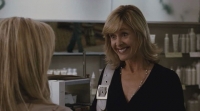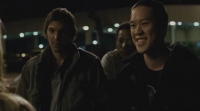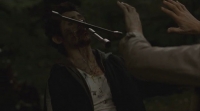Hitchcock once said, with his always wry sense of humor, that Psycho helped put murder back in the family, where it belongs. I’ve always taken this to mean that we don’t have to look further than our own backyard, or even our own skins, to find all the horror we can stomach. By this same logic, Susan Monford’s While She Was Out puts horror back in the American suburbia where, the film suggests, it’s been festering for a very long time. Just about every frame in the first half of the film reminds us that what we’re witnessing are the consequences of suburban expansion. Kim Basinger plays the role of Della, a battered and beleaguered housewife who lives in an expensive, but disheveled modern home in a prosperous gated community with her two kids and an over-worked, A-type alcoholic for a husband. Her only respite from all of this is a quick trip for wrapping paper to the sprawling, crowded shopping mall, where she can’t even find a place to park her giant SUV. And as if the parking situation weren’t bad enough, once inside Della also has to contend with obnoxious Stepford-wife suburbanites bragging about their husbands’ promotions that have paid for their swimming pools, large lawns, and salon-styled hair.
The message of the film is clear enough even after these first few scenes: the civility and trappings of suburban life is simply the pretense for something far more primitive and vicious lurking beneath it. But the film takes a turn towards the horrific when Della leaves the mall to be confronted by a vicious gang who attack her because she left them a note on their car chastising them for double parking. These particular hoodlums are, admittedly, a bit inexplicable in the way they’re so easily prompted to violence, as they seem to have no qualms over murdering a guard in well-lit parking lot, most likely covered by surveillance cameras. At this point, While She Was Out becomes far more allegorical than realistic. For instance, the gang is deliberately multi-ethnic, a parody of the globally-minded ethics of the United Colors of Benetton that Della might have been browsing inside the mall. They also parody the fear of those dangerous minorities and urban thugs that her gated community is so desperate to keep out. And I think it’s also deliberate that the gang’s leader, Chucky, is reminiscent of Krug from The Last House on the Left. In addition to their striking resemblance, both Chucky and Krug have no motivation other than being vicious and crazy.
The allegorical nature of this film is further reinforced by Della’s retreat into the dark confines of the forest beyond the illusory safety of her suburban bubble. She’s very much a “little red riding hood” alone in the woods with her own big bad wolf. But in this version of the fairy tale, her basket becomes a tool box, complete with a tire iron that she learns to wield in fairly gruesome fashion. The tool box is as deliberate as everything else in this film, particularly in the way it pays homage to slasher classics such as The Toolbox Murders, but especially the Slumber Party Massacre. Just as the girls in SPM band together to cut off the killer’s “drill,” Della uses her toolbox to turn the tables on her attackers. In doing so, she taps into hidden resources and reserves that enable her to embrace the wilder nature that’s been suppressed by her suburban confinement. Della’s no final girl. She’s a final woman, hear her roar!
This isn’t to say that there aren’t a few of problems with this film. There’s an odd scene in which the street-tough gang pour a 40 for their fallen while listening to Joy Division’s brooding, gothic classic “Day of the Lords.” I LOVE Joy Division, but it’s not the kind of music any self-respecting gangsta would ever listen to before a fight. Then again, these aren’t your ordinary street toughs, as Vingh taps into his inner-shaman and insists that Della has turned into an avenging spirit. And there are a few moments of painfully canned dialogue, as when Della delivers the lines “Where are you God” with enough melodrama and “ACTING!” to embarrass even SNL’s Master Thespian. Still, Basinger is terrific in just about every other scene. And the film’s final sequence is brilliant, in part because it’s punctuated so perfectly by Roxy Music’s ambiguous and creepy “In Every Dream There is a Heartache.” All in all, While She Was Out is a smart film with something very substantive to say about the way suburban culture might be damaging our better, and more primitive, natures.











3 Responses to While She Was Out
Subscribe Without Commenting